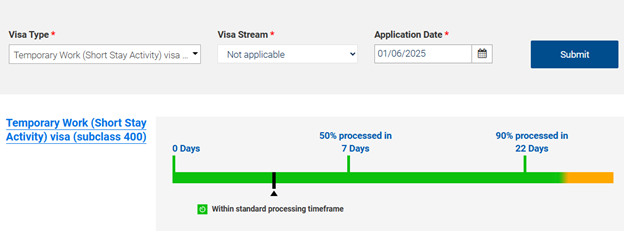Australia’s skilled migration program is facing criticism as visa processing delays continue to impact businesses and migrants across key visa categories. Despite persistent escalations and direct engagement by industry bodies such as the Migration Institute of Australia (MIA), the Department of Home Affairs has confirmed that no priority processing will be considered, even in urgent or compassionate circumstances.
Peter van Vliet, Chief Executive of the MIA, noted that these delays are having a significant impact on employers’ ability to hire workers with in-demand skills, creating challenges for Australian businesses trying to fill critical skill gaps.
Skills in Demand visa (Subclass 482 )
Skills in Demand visa (subclass 482), previously the Temporary Skill Shortage (TSS) visa, one of Australia’s strategies to fill critical skills shortages, has been particularly affected by delays. The Core Skills stream processes 50% of applications in 51 days, and 90% are processed in 3 months.

While the Specialist Skills stream has a target timeframe of 50% of applications processed in 8 days, and 90% in 67 days.

Temporary Work visa (Subclass 400)
The Temporary Work visa (subclass 400) Short Stay Specialist stream, typically processed by overseas embassies or high commissions, has also been affected by inconsistencies. Processing times vary depending on the applicant’s location at the lodgment:
- Europe and the Americas: 1–3 weeks
- Other locations: Often significantly longer, with a marked increase in refusals.
This unpredictability is creating challenges for employers seeking to bring in workers for short-term specialist work, compounding broader industry frustrations.
For the Short Stay Activity stream (subclass 400), 50% of applications are processed within 7 days and 90% within 22 days.

This has left employers grappling with bottleneck restrictions and uncertainty as they struggle to secure much-needed skilled workers.
Permanent Residence Visas
A noticeable slowdown has also emerged in the grant of permanent residence visas. While some business nominations are progressing, the actual visa grants are often delayed beyond 18 months. This has resulted in the expiry of time-sensitive documents such as police clearances and medical examinations, which are then re-requested by case officers, further extending processing times and compounding employer frustrations.
Broader implications
Industry leaders have voiced concerns that repeated escalation requests are being dismissed or even blamed for contributing to congestion in the system, effectively leaving employers and migrants without viable pathways to secure critical talent. As Peter van Vliet noted, delays are impacting employers’ ability to plan and fill crucial skill gaps in construction, cybersecurity, agriculture, health, and other sectors.
The end of the financial year is expected to add further complexity and potential delays to processing times.
In the face of these challenges, employers are left without clear pathways to address pressing workforce needs, risking lost opportunities and economic setbacks. The Migration Institute of Australia and other industry bodies continue to urge the government to address skills shortages and improve efficiency to keep the economy strong and businesses competitive.
Get in touch!
If your business is impacted by visa processing delays, contact Absolute Immigration at aisupport@absoluteimmigration.com Our experienced team is here to support you through the complexities of the visa process and help you navigate these challenges.






